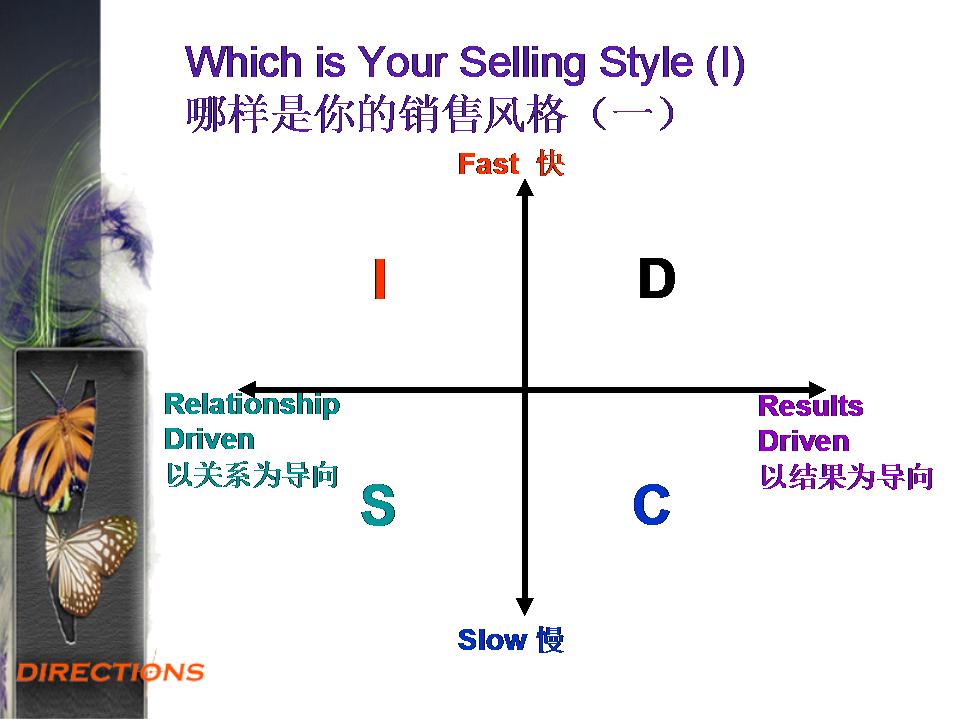|
Hi!
It's now summer, and if you want to know who are the most hardworking sales people, it's likely that they are the ones who will brave the hot sun and keep on visiting customers.
Besides having a great attitude to work real hard, effective sales people also have the right skills and knowledge to win customers and generate more sales.
Unlike most sales hiring practices that simply emphasize hiring based on prior sales experience in the same industry, we advocate a more objective approach that will enlarge your talent pool and reduce hiring costs.
We'll find out in this month's topics:
This issue's main article is on "How to Hire Highly Effective Sales People that Produce Great Results", and we'll see how we can identify great sales talent that will fit well into your company.
In brief:
To read the rest of this newsletter, pls. click here (http://www.psycheselling.com/page4.html.
Need to train your staff in topics such as Put More Accountability in Your Culture, Influence Without Authority, or Conducting Year End Reviews and Creating Development Plans, and 37 other leadership topics? Find out more about our face-to-face and eLearning solutions by e-mailing info@directions-consulting.com .
How to Hire Highly Effective Sales People that Produce Great Results by c.j. Ng
In our previous newsletter, based on recent studies by Leadership IQ tracking over 20,000 new hires, when new hires failed, 89% of the time it was for attitudinal reasons and only 11% of the time for a lack of skill. The attitudinal deficits include:
In the same issue, we also found that the cost of sales staff turnover can be as high as 150% of the employees' remuneration package, or more.
Earlier in our September 2007 newsletter, we also quoted studies from HR Chally with the following findings:
Simply put, there are 3 main criteria that every sales hire will have to fulfill if he or she were to produce any result for you:
So What Kind of Sales People Do I Need?
There are about 14 types of sales-related jobs, ranging from
telesales to customer service positions. However, for
the sake of simplicity, we will zoom in on 3 of the most
common sales positions: New Business Developers
(hunters), Account Managers (farmers) and Channel Sales
(indirect sales).
The competencies for a New Business
Developer include:
The competencies for an Account Manager include:
The competencies for a Channel Sales
person, is yet different, which
include:
Obviously, the competencies
required for the different sales roles can be quite
different. There have also been numerous occasions
when companies require one sales person to take on and
do ALL the above jobs!
The key to successful sales
hiring starts first by knowing what kind of sales roles
you need, and then find the right sales talent for that
role later.
Identifying the Right Sales Behaviours
Once you have identified the respective sales roles you are looking for, the next step will be how you can design the right questions so that you can spot them in interviews. This is actually very easily achieved, which unfortunately we usually screw up as we are being misled by so-called "behavioural-based interview" techniques. More can be read in our previous newsletter.
Depending on the sales role you are hiring, here are some sample questions you can use:
“Tell me a time when all your sales leads seem
to dry up, and you have difficulty meeting your
sales target”
“Tell me a time when your major customer had a
re-organisation, and they decided not to buy from you
anymore”
“Tell me a time when your one of your major
distributors simply does not produce any sales for
your new product after months of persuading them to
do so.”
As you can see in the above
questions, we tend to raise interview questions that
raise possible weakness in the sales person, and for a
good reason. Whether that sales person has the
resilience or motivation to sell for you depends a lot
when he or she is selling in an adverse condition.
Hence, sales candidates with a
good attitude are likely to say: “It
was a difficult period for me, but I was determined
to look for new leads in non-traditional and
unconventional ways... ...” “I
had always thought I knew my customers well, but
there really was a time when the entire management
was replaced. I had to make up for the lost
sales by increasing the sales from my other
accounts, and also get some more new accounts...
...”
“There was this distributor whose business model
was a
"box-moving trader"
who is real reluctant to spend time to educate
customers on the benefits of our new product
even though the price was higher. However,
we were able to provide enough coaching and
support to instil confidence... ...”
Based on the answers, you can
deduce the attitudes, and sometimes even the aptitudes
of your sales candidates. You can then decide whom
you'd want to hire.
Also, using the old adage, "hire
for attitude, and train for skills", even if
the candidate does not have the same industry experience
as yours, you can still broaden your talent pool.
As long as the candidate has the right attitude and
aptitude, the relevant skills can be trained easily.
Assessing Your Sales Candidates
While assessment tools are helpful in identifying the right
candidates, it can be very expensive if you are using such tools for
hiring sales people. In other words, if the assessment results
are negative, you will still have to pay for the assessments while
still deciding NOT to hire that candidate!
Hence, instead of paying for assessment tools to assess the
abilities, you can actually conduct a role play with the
candidate. You can
see here for a sample case study,
of which you can role play the part of the customer, while the
candidate role plays the part of the sales person.
Now you may need to have "model" answers to the role play, as well
as some "standard" questions that your typical customers will throw
at the candidate. You can then grade the candidate according
to their responses using a
score sheet. You can then
share the scores with other interviewers to reach your conclusion
without extra costs.
These role plays need not be long.
You can set a time-frame of 3-5 minutes per role play
Need help in
formulating your hiring strategy for sales people so that you achieve greater success
with your new sales hires? Simply e-mail
info@directions-consulting.com or
call +86-136 7190 2505 or Skype:
cydj001 and arrange to buy me a mocha. All information
shall be kept in confidence.
Power Breakfast Hour: 16 Aug 201 How to Hire Highly Effective Sales People that Produces Great Results
H How to use role plays as an assessment tool in making sure you hire the right sales talent
VENUE: Crowne Plaza Shanghai • 400 Panyu Road (near Fahuazhen Road) • 上海银星皇冠酒店 • 番禺路 400 号 (靠法华镇路)
PRICE: RMB 200 ONLY!
To make this a more conducive discussion, we are expecting a small group of about 15 people only. The room can only take in 18, so please register early to avoid disappointments. Please e-mail your registrations to sales@directions-consulting.com
Pls. check out our web sites www.directions-consulting.com and www.psycheselling.com/page4.html for more inspiration. Upcoming Events
In case you'd like to know what other public events we have, here's a snapshot of what's coming:
How to Achieve and Exceed HARD Goals
How to Use LinkedIn as a
Marketing Tool to Win New Customers
How to Build Highly
Effective Multi-Generational Teams
How to Hire Highly
Effective Sales People that Produce Great Results
How to
Build Highly Effective Multi-Generational Teams
How to Motivate Your Team
to Achieve Optimal Performance in Tough Times
Effective Conflict
Resolution and Cross-Department Communication
Simply e-mail your enquiries to to info@directions-consulting.com or call +86-21-6219 0021 for enquiries. Sample video and audio recordings available upon requests.
Tips for Managers: How to Create Your Own DIY Assessment Tool for Sales People?
By c.j. Ng
If you would like to make sure you hired the right sales person, sometimes you may want to use an assessment tool to make sure that you had made the right choice.
However, even according to one of the most sophisticated and
predictive assessment tools available for sales people,
HR Chally, there are
limitations as to what an assessment tool can tell you about
the candidate.
Hence, there are fewer companies who are willing to pay for
assessment tools if they are going to base 30% or less of
their hiring decisions. This is especially true for
sales positions where the staff turnover rate can be rather
high.
In the above diagram, we measure
in the Y-axis if a sales candidate is fast and
spontaneous, or if he is slow and deliberate. In the
X-axis, we measure if the sales candidate is
results-oriented or if he is relationship-oriented.
When customers make a request,
When you approach customers,
Using this next diagram, you can also measure if the sales
candidate prefers to sell concrete products with shorter
sales-cycles, or abstract solutions with longer
sales-cycles. You can also measure if the sales
candidate is more high-touch, i.e. he is willing to spend
more time to make sure customer satisfaction, or if he is
low-touch, where he is more focused in closing the sale.
Here's how you can ask: When you sell to customers,
During your sales meeting with your customer,
One thing to note is that there are no right or wrong answers, as there are only answers that match or don't match your winning sales strategies used by your other sales people.
One more important thing to note is that such DIY assessment tools are no way as accurate as the paid versions. These are used more as a complementary tool for a rigorous sales hiring process, where you just want to be doubly sure.
If you would like to find out how you can create your own DIY assessment tool, you can e-mail info@directions-consulting.com or call +86-136 7190 2505 or Skype: cydj001 About Directions Management Consulting
Directions Management Consulting is the partner of LeadershipIQ in China and Asia. LeadershipIQ helps more than 125,000 leaders every year through the facts drawn from one of the largest ongoing leadership studies ever conducted is used to help companies apply resources where the best possible results be achieved.
In addition, Directions Management Consulting is a leading provider of sales performance, innovation and experiential learning solutions in China and many parts of Asia. is the sales performance arm of Directions Management Consulting specialising in conducting training, research and consulting services for sales managers and their team.
Raybattle is the strategic partner of Directions Management Consulting specialising in experiential learning events and management retreats.
Currently, Directions Management Consulting has served clients such as InterContinental Hotels Group, Unilever, Bristol-Myers Squibb, Roche, Philips Lighting, Carrier, Ingersoll Rand, Freudenberg etc.
Through collaboration with consultancies such as Forum Corporation, MTI, de Bono China, ProWay etc., the consultants in Directions Management Consulting have served clients such as PwC, Air Products, Evonik, Wacker, Epson amongst others.
Directions Management Consulting will increase its efforts to conduct leadership studies in China and other parts of Asia, so that more companies apply resources where the best possible results be achieved in this part of the world.
Enquiries and suggestions, pls. e-mail info@directions-consulting.com or visit www.directions-consulting.com
|



